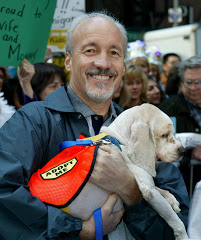When talking about “no-kill”, it is important to understand how this term is defined. At LA Animal Services “no-kill” means using the same criteria a compassionate veterinarian or loving guardian would use when deciding if euthanasia is appropriate. That is, euthanasia is only appropriate when an animal is terminally ill, terminally injured, or dangerously aggressive. When euthanasia is compassionately available for these animals alone we will have achieved “no-kill”.
LA Animal Services contends there is a loving home somewhere for all other categories of animals (the healthy, the treatable, and animals with behavioral issues that do not put people or other animals at serious risk of injury). Until all these animals are safely placed in loving homes Los Angeles has not achieved No-Kill. Until LA is not killing animals for reasons of space or limited medical resources we have not achieved No-Kill.
June 07 Statistics
Let’s look at the June 07 numbers. They reveal a timely snapshot of where we are now, but the real story is the consistent life saving trend we can document over the past five years.
June 07 dog and cat adoptions are up 26% compared to June 06 (1,552 from 1,233).
Dog adoptions are up 14% (839 from 733) and cat adoptions are up 43% (713 from 500).
The increase in cat adoptions appears to be the result of the community rallying to our calls for help with this year’s influx of cats.
New Hope Placements for dogs and cats is down slightly, 5.5% (344 from 376). Our New Hope program is a partnership with over 150 rescue organizations in California who help us place healthy and treatable animals at risk of euthanasia. New Hope placements for dogs is down 14% (291 from 340) but up 8% (235 from 217) for cats.
Where Animal Services Adoption and New Hope program’s synergistic efficiency truly reveals itself is in the euthanasia numbers. Dog and cat euthanasia in June 07 is down 30% (1,847) compared to June 06 (2,647). Dog euthanasia is down 30% (523 from 752) and cat euthanasia is also down 30% (1,323 from 1,895).
LA Animal Services implemented an aggressive orphan neonate kitten foster program this year. Neonates are kittens too young to survive on their own and in need of intensive foster care in order to survive. Neonates are animals state law defines as “unadoptable”, but LA Animal Services’ reverence for life No-Kill philosophy requires us to do everything we can to save these, the most helpless of all creatures.
In June 07 neonate kitten euthanasia decreased 59% (328 from 804). May 07 saw a 40% decrease in neonate mortality (192 from 319). These remarkable life saving results are being achieved by LA Animal Services employees and nearly 100 volunteer foster care givers who refused to let these animals die! I want to thank each and every one of you for your compassion and commitment to life!
In addition to the extraordinary efforts of our foster care givers, I want to thank our wonderful employees and volunteers for taking the time to help the public understand that by keeping these animals at home with momma until they are weaned they can greatly improve these babies’ chances of survival and, of course, for distributing Spay/Neuter Vouchers to get momma spayed after she weans this last batch of babies. These efforts resulted in a 21% decrease in the number of neonates coming into our Centers in June 07 compared to June 06 (862 from 1,095).
Fiscal Year 06/07 Statistics
In Fiscal Year (FY) 06/07, LA Animal Services took in 25,419 (55%) dogs and 20,898 (45%) cats.
34% (15,808) of all dogs and cats were owner relinquished, unwanted. 66% (30,686) were rescued by LA Animal Care Officers who found them as lost, roaming the streets, uncared for and perhaps just as unwanted.
LA Animal Services returned nearly 16% (4,037) of all incoming animals to their very grateful guardians. LA Animal Services consistently maintains the highest “return to guardian” rate in the country.
32% (6,634) of all cats taken (20,898) in were orphaned neonates.
Pit bull and pit bull mixes represent 25% (5,408) of all dogs taken in (25,493), 15% (1,463) of all dogs adopted, 4% (408) of all dogs placed through New Hope, and 41% (2,574) of all dogs euthanized.
In FY 06/07, LA Animal Services dog and cat adoptions are up 6.8% (15,098 from 14,125). Dog adoptions are up nearly 12% (from 8,772 to 9,813) and cat adoptions are down about 1% (5,285 from 5,353).
New Hope placements are down 1.7% (5,918 from 6,023). However, the combination of adoptions and New Hope placements is 21,016 – making LA Animal Services the highest volume pet adoption agency in the world.
In FY 06/07, Los Angeles euthanized (or killed) 17,314 dogs and cats. This represents the fewest number of dogs and cats euthanized in LA ever in a one year period. This is an 11.25% decrease from the previous Fiscal Year in which 19,508 dogs and cats were euthanized. LA Animal Services has consistently reduced euthanasia over the past five years in the double digits. 15% in 02/03. 12% in 03/04. 16% in 04/05. 10% in 05/06. 11.25% in 06/07. This represents a 50% decrease over the past five years from 34,329 to 17,314.
A sincere thank you to all of you who are helping to make No-Kill an achievable goal in LA!

